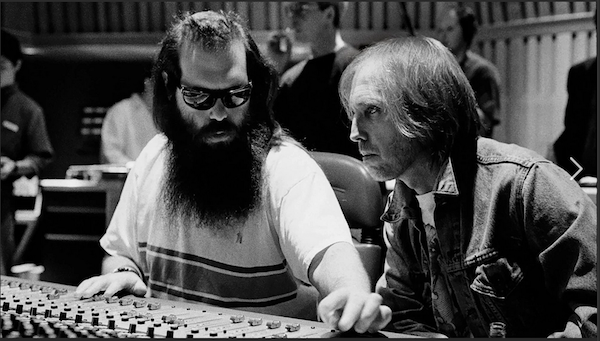Tom Petty, Somewhere You Feel Free resurrects 16mm footage documenting the making of Wildflowers, the musician’s second solo outing, between 1993 and 1995. Best for Petty completists, the documentary is a shambling, shaggy-haired look at a lost world. Drinks, drugs, chain-smoking: even at the time Petty seemed to realize it was all slipping away.

Some constants in Somewhere You Feel Free: Petty himself, one of the most photogenic musicians of his time; cigarettes, stubbed out in ashtrays, balanced on counters, drifting smoke, inhaled, tossed aside, stuck into guitar necks; a still photographer clicking every move, every conversation, every “moment”; and Martyn Atkins, commissioned to shoot a “making of” on 16mm black-and-white film.
The footage was ignored for years, until last year’s Wildflowers and All the Rest CD box set showed that it was still possible to monetize Petty’s library. Director Mary Wharton surrounds Atkins’ footage with new interviews with producer Rick Rubin and musicians like Mike Campbell and Benmont Tench, mostly in widescreen black-and-white. We also see music videos, concert footage, some recreations of locations and events, like Petty’s performance at the Hollywood Bowl.
Flash frames, sprocket holes, outtakes all testify to the project’s documentary “realness,” although there’s a sense throughout that Petty is always on, always aware of the lens, always performing. The quality of the footage varies from pristine to grainy and speckled. Synch is sometimes a problem, never a distracting one.
Wildflowers marked a turning point in Petty’s career primarily because he changed the people he worked with. Getting rid of long-time drummer Stan Lynch, for example, and producer Jeff Lynne (one of The Traveling Wilburys). Adding Rubin and drummer Steve Ferrone. Finding a new record label (Warner Bros. instead of MCA). Getting divorced.
For such a demonstrative and autobiographical writer, Petty is surprisingly guarded here. “I was becoming disenchanted with my wife,” he says in a tape-recorded interview. “Rick Rubin, he just loves music, he’s not a corporate man.” The film is dotted with similar bromides, non-threatening and not very illuminating. “My dad was constantly fighting the label,” his daughter Adria, one of the producers here.
Petty, Rubin and the others provide some limited background to the songs on Wildflowers. “Harry Green” was Petty’s “old friend,” for example. Director Wharton at times can show the progression of a song from demo to recording sessions to live versions.
My favorite Tom Petty interview is one conducted by Gary Shandling for his Larry Sanders Show box-set, an expansive, engaging conversation about fame and its effects on their lives. Tom Petty, Somewhere You Feel Free by contrast is a narrow window into a transitional moment in a superstar’s career. Best for fans, and perfect for SXSW, where it premiered on March 17, 2021.


